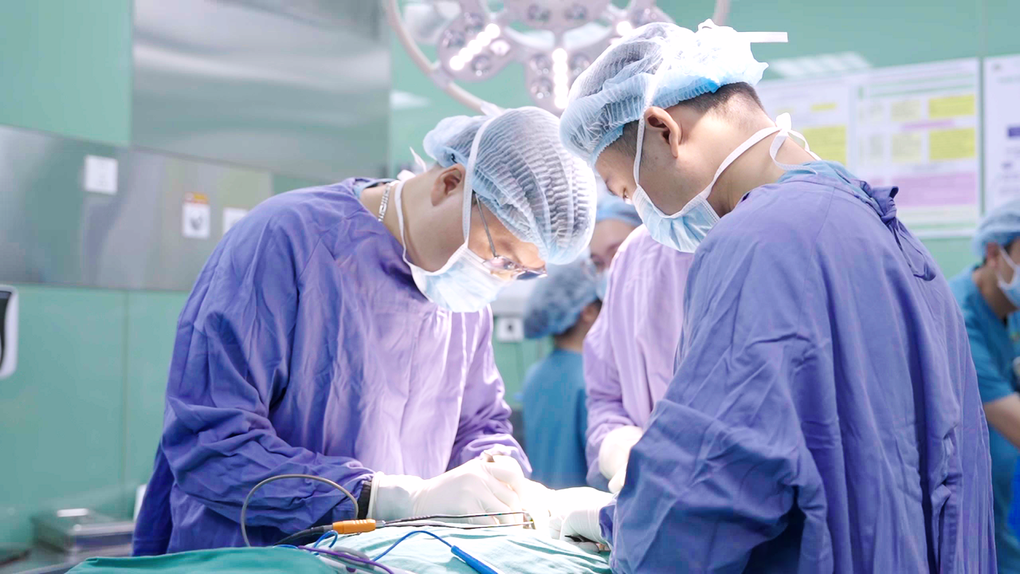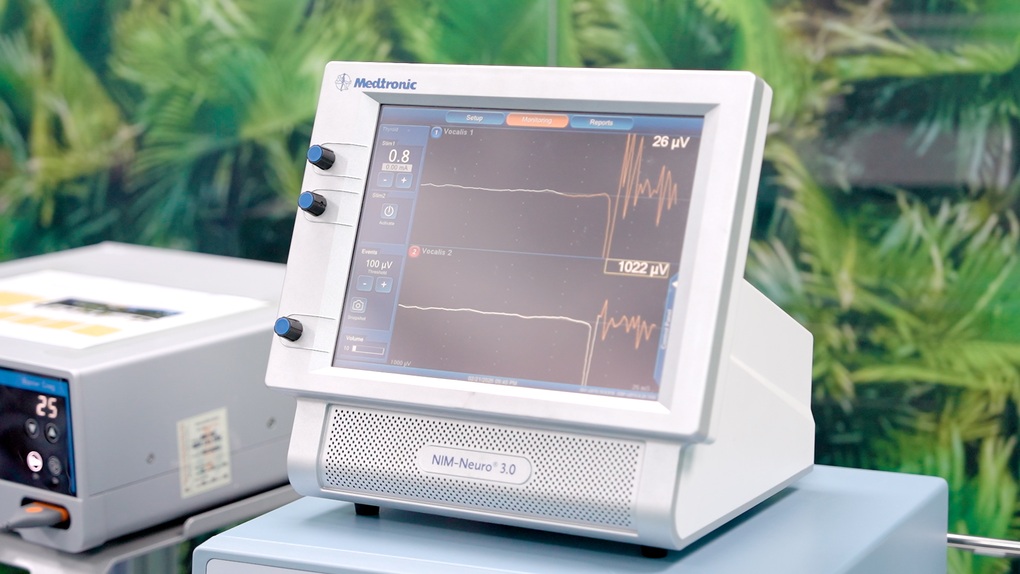However, if performed correctly, modern technology not only completely eliminates the damage but also significantly reduces pain and preserves the patient's voice.
Neck dissection - An important step in thyroid surgery
Papillary thyroid cancer is the most common form of thyroid cancer today. Cancer cells often spread through the lymphatic system to the neck lymph nodes, even when the tumor is small and there are no obvious symptoms. Many studies show that the rate of metastasis to the central neck lymph nodes in papillary cancer can be up to 30-50%.
However, prophylactic central cervical lymphadenectomy in the absence of clear evidence of metastasis is not always recommended, as it may increase the risk of damage to the laryngeal nerve and parathyroid glands, causing complications that may have long-term effects on voice and endocrine function.
MSc.BSNT Nguyen Xuan Quang - Head of the Department of Otorhinolaryngology and Head and Neck Surgery, Hong Ngoc General Hospital said: "In the treatment of thyroid cancer, proper neck lymph node dissection right from the first surgery plays a key role. However, the decision to dissect to what extent should be based on imaging assessment and cytological results. At the same time, technical capacity and modern supporting equipment will help significantly reduce the risk of complications."

Neck lymph node dissection helps to completely remove the lesion (Photo: BVCC).
Application of modern support equipment - pain relief, voice preservation and parathyroid gland preservation after surgery
Proper, complete and safe neck lymph node dissection right from the first surgery not only helps to completely remove cancerous lesions, but also plays an important role in preventing recurrence, preserving the voice and shortening recovery time.
To achieve this effect, the surgeon needs to perform the operation meticulously and accurately, while combining the application of modern support equipment. Many hospitals have applied the nerve probe (NIM) to help identify and protect the laryngeal nerve and the fluoroscopy device (ICG) - to support the identification and preservation of the parathyroid gland.
Pioneering the deployment of these devices at Hong Ngoc General Hospital, MSc. Dr. Nguyen Xuan Quang shared: “In complicated neck dissection cases, the nerve probe helps determine the location of the laryngeal nerve, sends a warning signal when approaching the risk area, and re-checks the conduction function after intervention. Thanks to that, we can perform a thorough dissection while still ensuring safety, without causing hoarseness or loss of voice. Similar to the role of the nerve probe with the vocal cords, the ICG device helps preserve the parathyroid gland more safely and proactively, thereby significantly reducing the risk of postoperative hypocalcemia.”
According to Dr. Quang, the key factor in making the surgery smooth is the surgeon's technique. If performed by an experienced doctor, each dissection will be gentle, precise and cause less damage to surrounding tissue. Combined with supporting equipment, the patient does not even need to use painkillers after surgery.

Application of voice preservation neural probe for patients (Photo: BVCC).
A typical case is that of Ms. NHT (55 years old, Thanh Hoa ), who discovered multiple metastatic lymph nodes in the neck area after having had thyroid cancer surgery 3 years ago. Having the surgery again, she was very worried that she would be in pain and afraid of losing her voice when having to have a large-scale neck lymph node dissection. However, at Hong Ngoc General Hospital, with the support of a nerve probe and an experienced surgical team, she underwent a smooth surgery.
Dr. Quang directly performed a thorough surgical procedure to remove all the related neck lymph nodes without pain, while preserving the laryngeal nerve and parathyroid gland, helping Ms. T retain her voice. After only 1 day, Ms. T recovered well and was able to eat, drink, and talk normally.
“I was very afraid of pain, especially when I knew I would have to have open surgery on my neck and have my lymph nodes removed. But surprisingly, after the surgery, I almost had no more discomfort, my throat didn’t hurt, I didn’t even need to take any painkillers, and I could sit and talk to my husband for an hour right after the surgery,” Ms. T shared.

Master, Doctor Nguyen Xuan Quang examines a patient after surgery (Photo: BVCC).
According to Dr. Quang, neck dissection surgery in the treatment of thyroid cancer is an important step, but it does not mean pain or serious complications if performed properly. Thanks to the combination of surgeon skills and the support of modern equipment, the surgery can become gentle, precise, minimally invasive, preserving the voice, helping the patient recover quickly and maintain the quality of life after surgery.
Hong Ngoc General Hospital is a prestigious address in diagnosing and treating thyroid cancer, gathering a team of experts with more than 15 years of experience in thyroid cancer surgery, effectively handling complicated cases such as recurrent neck lymph nodes, invasive tumors...
Make an appointment for an in-depth examination of ENT and Head and Neck Surgery, Hong Ngoc General Hospital - Phuc Truong Minh
Address: No. 8 Chau Van Liem, Tu Liem Ward, Hanoi .
Hotline: 0912 002 131
Source: https://dantri.com.vn/suc-khoe/nao-vet-hach-co-trong-phau-thuat-ung-thu-giap-co-gay-dau-tang-nguy-co-bien-chung-20250815140835336.htm



























![[Photo] An Phu intersection project connecting Ho Chi Minh City-Long Thanh-Dau Giay expressway behind schedule](https://vstatic.vietnam.vn/vietnam/resource/IMAGE/2025/8/21/1ad80e9dd8944150bb72e6c49ecc7e08)
































![[Photo] Politburo works with the Standing Committee of Hanoi Party Committee and Ho Chi Minh City Party Committee](https://vstatic.vietnam.vn/vietnam/resource/IMAGE/2025/8/21/4f3460337a6045e7847d50d38704355d)

































Comment (0)